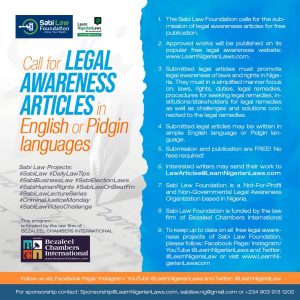Above all, the “unequals” must coexist effectively for there to be a healthy society. The big question is;“What protects an illiterate while he relates with literates and even other illiterates?”Nigeria is the most populated African nation and has both literate and illiterate persons. They are more illiterates in Nigeria than literates; hence in everyday a literate and illiterate person must relate together in Nigeria. What then is the protection for illiterates? What protects an illiterate that is about to lease his ancestral home to a multinational telecommunication company?
The level of illiteracy in Nigeria is still very high consequently a vast majority of Nigerian citizens are in need of special protection from fraud. This protection is contained in the Illiterates ProtectionLaws, Legal Practitioner Act, Statutes of Fraud Act 1677 and Land Instrument Preparation Laws among others.
Below, is some of the protections, the Nigerian laws have provided toguard the rights and interest of illiterate persons (Nigerians or foreigners) in Nigeria.
1. ILLITERATES PROTECTION ACT:
The ILLITERATES’ PROTECTION ACT is a law set to protect illiterates from fraud. Presently in Nigeria there are Illiterates Protection Laws for the different thirty-six (36) States of the federation and an Illiterates Protection Act for the Federal Capital Territory(The Federal Capital Territory does not have a separate legislative arm (House of Assembly) of its own rather the National Assembly makes laws for it, hence such laws are also referred to as “Acts”). The contents and intent of the Illiterates Protection Laws of the States across Nigeria and that of Illiterates Protection Act of the Federal Capital Territory are same.Consequently, reference will be made to just that of the Federal Capital Territory; Illiterates Protection Act 1920. Please note that, presently there is no Illiterates Protection Act enacted by the National Assembly for the entire nation. The last Illiterates Protection Act for the whole nation was last seen in the 1975 Laws of the Federation of Nigeria and was omitted in the 1999, 2003 and 2007 Laws of the Federation of Nigeria. Consequently, there is no single Illiterates’ Protection Act for Nigeria as a whole rather various similar Illiterates Protection laws of states and the Federal Capital Territory.
Illiterates Protection Act protects all kinds and types of transactions, documents, letters, forms, agreements written at the request of an illiterate; be it school undertakings, church agreements, bank letters, rent agreements, car purchase agreements etc. An ILLITERATE PERSON is one that cannot read, write or understand a particular document. From the above; it is arguable that an educated person who may not be able to understand a particular document can be said to be an illiterate person.It is the inability to read or write or understand that qualifies a person to be protected by the Act. Hence, a professor of medicine that cannot understand the content of a specialised international concession agreement can be said to be an illiterate. It is unsatisfying that the Act clearly defined the term “writer” but left out “illiterate” and “illiterate person”. Well, let me leave the further interpretationsfor the courts.Below are the specific elements that MUST be contained in such letters or documents;
a. VERIFICATION NOTE:
Since an illiterate is not be able to read, write and understand a document; such a person will need the assistance of literate person. Hence illiterate persons often engage the services of literates to write their letters, memoranda and other documents as transactions will demand. By the provisions of SECTION 2 OF THE ILLITERATES PROTECTION ACT; any person who writes a letter or document at the request, on behalf of or in the name of an illiterate person shall also write on such document his own NAME as the writer and his ADDRESS. Such Verification Note/Statement means that the literate person was duly authorised to write the document; that what the literate wrote is a clear representation of the illiterates personsinstruction and if signed by the illiterate person; that the content of the document was read out and interpreted to the illiterate person before he/she signed or made his mark on the document. Note that once a Verification Note is provided there is no need for a JURAT (a brief statement on a document stating that the content of a document was specifically read and interpreted to a person; who upon understanding same signed or made his mark on the document. It must also include the name of the interpreter and his signature).
Take note that where there is a contrary evidence to show that a literate person did not write what he was instructed to write by an illiterate person, the court will jettison the Verification Note on the concerned document.In a situation, where a literate person after writing a letter or any documents for an illiterate, fails to insert a Verification Note or where he inserted such a verification Note while the contents of the letter/ document is untrue; such a literate person shall be liable to a fine of N100 and six (6) months imprisonment where in default of payment. A verification Note is a vital security measure to keep a tab on the acts of a literate person on behalf of an illiterate person to ensure discipline and sincerity.
b. FEE CLAUSE
A literate person may be engaged to write a document for a fee, reward or free; whatever be the case such must be clearly stated on each copy of the letter/document written by the literate person. SECTION 6 OF THE ILLITERATES PROTECTION ACTdemands that where a document is being prepared for a fee or reward, the literate person is to state the specific amount being charged or the kind/reward been taken by him. If it is for free, same should be equally stated on all copies of the letter/document. The total number of documents written including copies made must equally be stated on all the letters/documents.
Just as in every other business transaction, the Illiterates Protection Act expects a literate person to issue receipt to an illiterate person for every payment made to him for writing a letter or document for the illiterate person. See SECTION 7 OF THE ILLITERATES PROTECTION ACT.
It is an offence for a literate person not to state on each copy of a letter/document he prepared for an illiterate person his fee and the number of documents he wrote or to issue a receipt. Such a person is liable on conviction to One Hundred Naira or six (6) months imprisonment if in default of fine.
c. EXEMPTION FOR LAWYERS
A lawyer is a person (not a firm) that has been called to the Nigerian Bar and enrolled in the Supreme Court of Nigeria as a Barrister and Solicitor. Note that one who has a law degree (even a PHD) is not a lawyer until he or she is called to the Nigerian Bar. Writings, documents and letters written for or on behalf of an illiterate by a lawyer does not require the above requirements. Hence lawyers are not expected to state verification and fee clauses on documents they prepare. Such documents are expressly exempted from the provisions of the Illiterates Protection Act. The Illiterates Protection Act does not apply to letters and documents written by lawyers. See,SECTION 4 ILLITERATES PROTECTION ACT.
With the above it is clear that any person apart from a lawyer can write a letter/document for an illiterate but such writing will be valid if it contains the above requirements.
2. LAND INSTRUMENT PREPARATION LAWS:
In the past many illiterates sold out their lands believing they were merely leasing out such lands.Till today Illiterates are made to sign documents different from what they believed they were signing. Many people stop by business centres and internet cafes to seek the unprofessional assistance of typists in printing templates for land transaction agreements.Such practise is unhealthy and illegal. Where the land instrument preparation law exists such unprofessionally prepared documents are illegal and invalid; sheer waste of resources.
Among the enactments that protect the interest of illiterates is; The LANDINSTRUMENT PREPARATION LAW, CAP. 84 LAWS OF KADUNA STATE, 1991.Due to the dangers that faceparties to land contracts especially illiterates, the law providesthat only Legal practitioners can prepare instruments and documents on land transactions. By this law any land transaction document prepared/created by a person other than a lawyer is invalid. SeeSECTIONS 5 AND 6 OF THE LAND INSTRUMENT PREPARATION LAW.With theinput of a lawyer in a land transaction, the rights, privileges and intentions of an illiterate just like that of a literate will be adequately protected. Hence, this law erases the possible hardshipilliterates would have suffered in the hands of unscrupulous literate persons. It is disturbing, that the Land Instrument Preparation law is yet to be enacted in many states of the federation.
3. LEGAL PRACTITIONERS ACT:
One sure professional that should never defraud a client is a lawyer. Lawyers are trained professionals; hope of the common man. As tool of Justice, every lawyer has the interest of the people especially the vulnerable group; including the illiterates. Lawyers will not prepare documents for an illiterate and mischievously misrepresent the interest of the illiterate; such will be highly unprofessional. Without sounding immodest, lawyers are the best persons that can write for or on behalf of illiterates. The professional demand of the profession is on its own a huge protection for illiterates as evidenced in the RULES OF PROFESSIONAL CONDUCT FOR LEGAL PRATITIONERS 2007.
Specifically some type of documents and letters can ONLY be written/prepared by lawyers. One of such are documents relating to land transactions! In the whole of Nigeria, no person other than a lawyer is allowed for a reward to prepare land transaction documents. Hence, the interests of illiterates are highly safeguarded in every land transaction owing to the fact that a lawyer will couch the agreements and documents thereto. Please note that any document relating to land transaction that is prepared for a reward by a non-lawyer is invalid. Apart from such document being invalid, the act itself is an offence and the maker/writerof such documents is liable to a fine and or imprisonment for two year. See, SECTION 22 (1) (D) OF THE LEGAL PRACTITIONERS ACT. It is the sole responsibility of legal practitioners to prepare land transaction documents for a reward to the exclusion of ALL other persons in Nigeria;estate agents, valuers, developers, surveyors, architects and other professionals. This is a protection for illiterates (and literates) to ensure transparency and clear representation of intents.
4. STATUTE OF FRAUD ACT, 1677:
One of the oldest laws imported from Britain to Nigeria is the STATUTE OF FRAUD ACT OF 1677. As the name implies, it is a special Act for prevention of frauds and perjuries. It protects both illiterates and literates in transactions. It has laid down certain regulations for land transactions to ensure protection of parties’ intent. The Act has made it compulsorythat transactions and dealings on land MUST be documented; written. So, that mere oral agreement in dealings of land is not allowed. Specifically SECTION 4 of the STATUTE OF FRAUD ACT provides that no action shall be brought upon any contract for the sale or disposition of land or any interest, unless the agreement upon which such action is brought or some memorandum or note thereof is in writing, signed by the party to be charged or by same person through his lawfully representative.
By putting in writing every land transaction, an illiterate just like an illiterate will be afforded equal opportunities to have his intentions clearly documented by another and the details of such person properly exhibited on the land documents.Any writer of the intentions of an illiterate in a land transaction is required by the STATUTE OF FRAUD ACT, 1677to observe the legal requirements set out by the law in the ILLITERATES PROTECTION ACTas shown above. Above all, it is pertinent to remind all, that it is only legal practitioners that can write documents relating to land transaction for a profit (As provided in SECTION 22 (1) (D) OF THE LEGAL PRACTITIONERS ACT). Hence, the Statue of Fraud sets a fulcrum that swings the other protections available to illiterates especially in land transactions.
Any land transaction that is not written cannot be enforced. The only proof of land deal is written documents to same. Apart from the Statute of fraud that provided for this, same provision is contained in SECTION 67 (1) OF THE PROPERTY AND CONVEYANCING LAW OF 1959, SECTION 67 OF THE LAW OF PROPERTY LAW, CAP 23 LAWS OF ABIA STATE 1999 and SECTION 5 (2) OF THE LAW REFORM (CONTRACT) ACT OF THE FEDERAL CAPITAL TERRITORY, 2006. Please note that, land transaction under the customary law and ownership system does not need to be written, because writing is alien and unknown to customary ownership; one of the relics of colonisation. Consequently, illiterates involved in land transactions under the customary law ownership are to be protected by the accepted requirements of a valid sale of land under customary law; for examplePrice, Presence of witnesses and Parties to oral agreements. For more on customary land law transactions read my publication, “SAFEST MEANS TO PURCHASE RURAL LANDS”. All the above protections and many more are the present legal protection for the illiterates in Nigeria.
Sabi Law Projects:
#SabiLaw
#DailyLawTips
#SabiBusinessLaw
#SabiElectionLaws
#SabiHumanRights
#SabiLawOnBeatFm
#SabiLawLectureSeries
#CriminalJusticeMonday
#SabiLawVideoChallenge
Speak with the writer, ask questions or make inquiries on this topic or any other via onyekachi.umah@gmail.com, info@LearnNigerianLaws.com or +2348037665878 (whatsapp).
To receive free Daily Law Tips, join our free WhatsApp group via https://chat.whatsapp.com/GAEPC3mH1ik0Ghq0yvzbvv or Telegram group, via the below link: https://t.me/LearnNigerianLaws
To keep up to date on all our free legal awareness projects of Sabi Law Foundation, follow us via
Facebook Page:@LearnNigerianLaws, Instagram: @LearnNigerianLaws, Twitter: @LearnNigeriaLaw and YouTube: Learn Nigerian Laws
Please share this publication for free till it gets to those that need it most. Save a Nigerian today! NOTE: Sharing, modifying or publishing this publication without giving credit to the author or Sabi Law Foundation is a criminal breach of copyright and will be prosecuted. This publication is the writer’s view not a legal advice and does not create any form of relationship. You may reach the writer for more information.
This publication is powered by www.LearnNigerianLaws.com {A Free Law Awareness Program of Sabi Law Foundation, supported by the law firm of Bezaleel Chambers International (BCI).} Sabi Law Foundation is a Not-For-Profit and Non-Governmental Legal Awareness Organization based in Nigeria.
























































One Response
This write-up very well elucidates the topic.
Thanks so much.